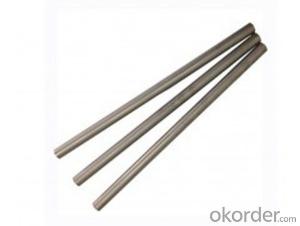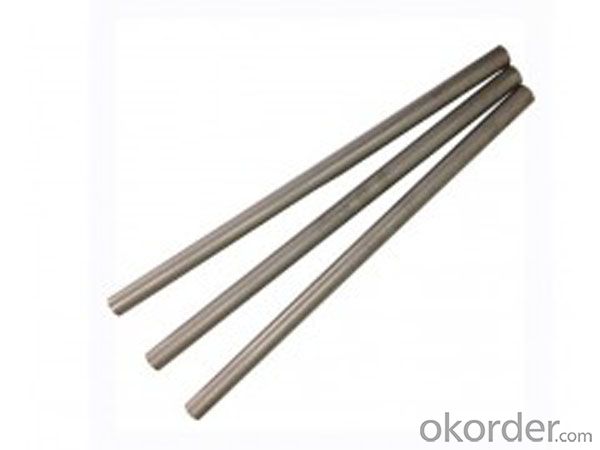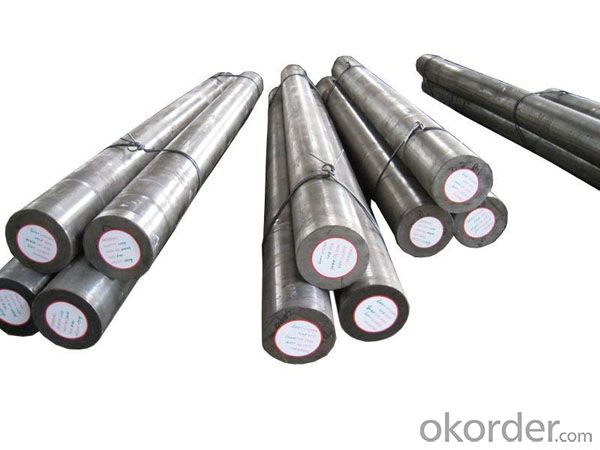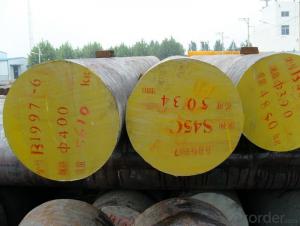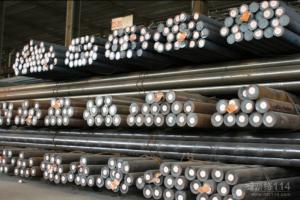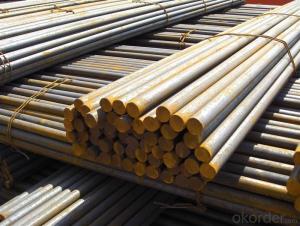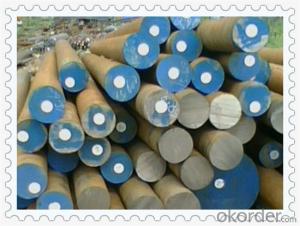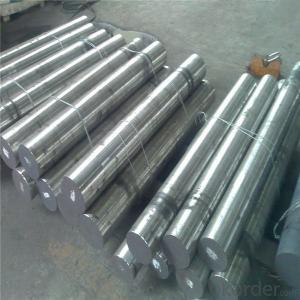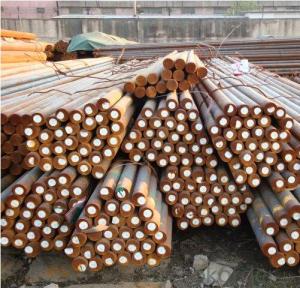Alloy Steel SUJ2 Bearing Round Steel Special Steel
- Loading Port:
- China main port
- Payment Terms:
- TT OR LC
- Min Order Qty:
- 25 m.t.
- Supply Capability:
- 10000 m.t./month
OKorder Service Pledge
OKorder Financial Service
You Might Also Like
Specification
Chemical Composition(GB)%
| C | Si | Mn | Cr | Cu | S |
| 0.95-1.05 | 0.15-0.35 | 0.25-0.45 | 1.4-1.65 | ≤0.20 | ≤0.020 |
Heat Treatment
| Item | Temperature ℃ | Hardness |
| Anneal | 790-810 | 170-207HB |
| Quenching | 830-860 | 62-66HRC |
| Tempering | 150-180 | 61-66HRC |
Characterstics
| 1.Uniform hardness,Good abrasion resistance |
| 2.High contact fatigue resistance |
| 3.Cutting performance in general |
Applications: Used to make the load of the larger small cross-section conditioning and stress smaller large parts


1, Your advantages?
professional products inquiry, products knowledge train (for agents), smooth goods delivery, excellent customer solution proposale
2, Test & Certificate?
SGS test is available, customer inspection before shipping is welcome, third party inspection is no problem
3, Payment Terms?
30% TT as deposit and 70% before delivery.
Irrevocable L/C at sight.
4, Trading Terms?
EXW, FOB, CIF, FFR, CNF
6, After-sale Service?
We provides the services and support you need for every step of our cooperation. We're the business partner you can trust.
For any problem, please kindly contact us at any your convenient time.
We'll reply you in our first priority within 24 hours.
- Q: How are titanium alloys used in the medical industry?
- Titanium alloys are widely used in the medical industry due to their unique properties such as high strength, biocompatibility, and corrosion resistance. They are commonly used in medical implants, such as joint replacements, dental implants, and bone plates. These alloys promote better bone integration and reduce the risk of rejection or infection, providing patients with long-lasting and effective medical solutions. Additionally, titanium alloys are also used in surgical instruments and equipment, as they are lightweight and durable, enabling precise and efficient procedures.
- Q: What are the challenges in machining special steel with complex geometries?
- Machining special steel with complex geometries poses several challenges. Firstly, the high hardness of special steel makes it difficult to cut and shape. This requires the use of specialized cutting tools and techniques to ensure precision and avoid tool wear. Secondly, the complex geometries of the steel components make it challenging to achieve accurate and consistent machining. This may require the use of advanced CNC machines and software programming to accurately replicate the intricate shapes. Additionally, the heat generated during machining can lead to thermal distortion and surface hardening, which further complicates the process. Therefore, careful planning, efficient cooling, and proper machining parameters are essential to overcome these challenges and achieve the desired results.
- Q: How does special steel contribute to the ductility of products?
- Special steel contributes to the ductility of products by offering enhanced mechanical properties such as higher tensile strength and improved toughness. This type of steel is specially formulated with alloying elements that promote grain refinement and uniform microstructure, allowing the material to withstand greater deformation without breaking or cracking. Additionally, special steel often undergoes specific heat treatment processes that further enhance its ductility, ensuring that the final products can be easily shaped, bent, or stretched without compromising their structural integrity.
- Q: How does special steel perform in high-temperature oxidation resistance?
- Special steel is specifically designed to have excellent high-temperature oxidation resistance. It is able to withstand prolonged exposure to high temperatures without undergoing oxidation, ensuring its structural integrity and performance are maintained even in extreme conditions.
- Q: How does special steel contribute to the transportation equipment industry?
- The transportation equipment industry relies heavily on special steel for several reasons. To begin with, special steel alloys are utilized in the manufacturing of various vehicle components, including engine parts, suspension systems, and transmission components. These alloys possess exceptional strength, durability, and resistance to corrosion, ensuring that vehicles can withstand harsh operating conditions and have a longer lifespan. Furthermore, special steel is crucial in the production of railway tracks and infrastructure, which greatly contributes to the efficiency and safety of transportation systems. The high-quality steel used in railway tracks ensures stability, reduces maintenance requirements, and improves overall railway performance. Moreover, special steel is employed in the manufacturing of aircraft components, where precision, reliability, and lightness are of utmost importance. Steel alloys with outstanding mechanical properties are utilized in critical parts like landing gear, engine components, and structural elements, guaranteeing the safety and efficiency of air transport. Additionally, special steel plays a vital role in shipbuilding and the production of marine vessels. The use of corrosion-resistant steel alloys in shipbuilding helps to prevent rusting, extending the lifespan of vessels and reducing maintenance costs. Moreover, certain steel alloys with a high strength-to-weight ratio allow for the construction of lighter ships, resulting in increased fuel efficiency and reduced emissions. In summary, special steel's exceptional properties and characteristics make it an essential material in the transportation equipment industry. It enhances the performance, safety, and durability of vehicles, railways, aircraft, and ships, ultimately improving the efficiency and reliability of transportation systems.
- Q: How is corrosion-resistant stainless steel used in the production of marine equipment?
- Corrosion-resistant stainless steel is extensively used in the production of marine equipment due to its ability to withstand the harsh corrosive environment of saltwater. It is used for various applications such as shipbuilding, offshore structures, and marine components like propellers, valves, and fittings. The stainless steel's resistance to corrosion helps prevent rust and degradation, ensuring the longevity and durability of marine equipment even in challenging marine conditions.
- Q: What are the properties of aluminum alloys?
- Aluminum alloys possess several properties that make them highly desirable in various industries. These properties include lightweight, excellent corrosion resistance, high strength-to-weight ratio, good formability, and electrical conductivity. Additionally, aluminum alloys can be easily cast, machined, and welded, making them highly versatile in different applications.
- Q: How does special steel perform in cryogenic toughness?
- Special steel performs well in cryogenic toughness due to its unique composition and manufacturing processes. It is specifically designed to maintain its strength, hardness, and toughness even at extremely low temperatures. This makes it highly resistant to brittle fracture and ensures reliable performance in cryogenic applications, such as liquefied natural gas (LNG) storage tanks, aerospace components, and superconducting magnets.
- Q: How does special steel perform under low temperatures?
- Special steel performs well under low temperatures due to its high strength, toughness, and resistance to brittle fracture. It retains its mechanical properties and does not become brittle like other materials, making it suitable for applications in cold environments.
- Q: How does special steel contribute to the defense industry?
- Special steel contributes to the defense industry in various ways. Its exceptional strength, durability, and resistance to corrosion make it an ideal material for manufacturing military equipment, such as tanks, submarines, and aircraft carriers. Special steel is also used in the production of firearms, missiles, and armored vehicles, providing enhanced protection and performance capabilities. Additionally, its heat resistance and ability to withstand extreme temperatures make it suitable for crafting jet engines and other critical components used in military aircraft. Overall, special steel plays a crucial role in ensuring the reliability, safety, and effectiveness of defense equipment.
Send your message to us
Alloy Steel SUJ2 Bearing Round Steel Special Steel
- Loading Port:
- China main port
- Payment Terms:
- TT OR LC
- Min Order Qty:
- 25 m.t.
- Supply Capability:
- 10000 m.t./month
OKorder Service Pledge
OKorder Financial Service
Similar products
Hot products
Hot Searches
Related keywords
